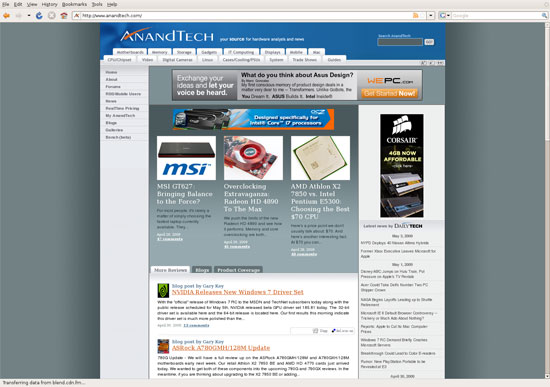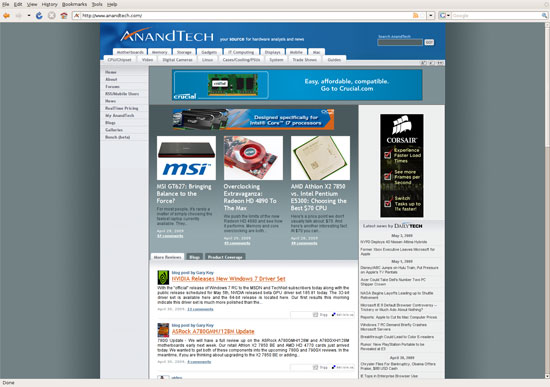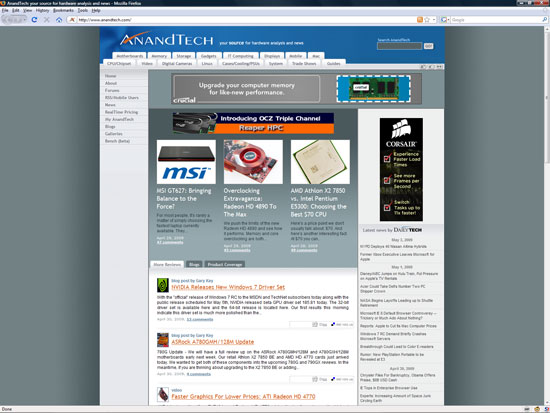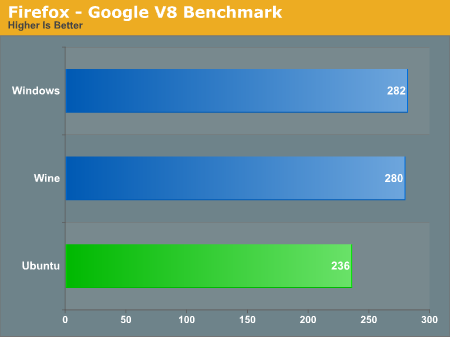Revisiting Linux Part 1: A Look at Ubuntu 8.04
by Ryan Smith on August 26, 2009 12:00 AM EST- Posted in
- Linux
Applications: Web Browsing
Windows Default: Internet Explorer 7
What I use: Firefox 3
Ubuntu Default: Firefox 3
Much to the chagrin of Microsoft, the web browser is turning in to a miniature OS of its own, and in the case of anything that’s not Internet Explorer, it’s a miniature OS that has no allegiance to a real operating system. It’s the primary way to retrieve most information from the internet, applications can be created through AJAX and Flash, video can be watched (see: Hulu). A good cross-platform web browser removes a great deal of the need to use any specific OS, and this is something that works in Ubuntu’s favor.
Ubuntu ships with Firefox 3, Internet Explorer’s loyal opposition and currently the #2 browser on the market. So long as a site isn’t built for IE6 Firefox has great compatibility, good speed, and an army of extensions to add features to it. Since many of you already use it, there’s not a lot to say here: it’s a very solid browser, and something I find to be superior to Internet Explorer.

As I already use Firefox under Windows, the transition here was virtually non-existent. Ubuntu doesn’t have any direct Windows to Ubuntu transition tools, but after moving my Firefox profile from Windows to Ubuntu and reconfiguring a few location-sensitive settings, I was up and going. Internet Explorer users are going to have more of a transition obviously, but it’s not much. All of the major browsers’ core behaviors are the same, which makes it easy to switch among them with little fuss.
At the risk of marginalizing the rest of Ubuntu, I consider Firefox to be one of the core components that makes Ubuntu a success story. Because so much computer use these days is inside a browser, it has become a lynchpin for a good OS. If your browser is bad, then it’s probably hurting the usability of your OS if it means that many users cannot do something they regularly do on another browser. One only needs to look at the early versions of Mac OS X to get a good picture of this, as it shipped with the only-bearable Internet Explorer 5.
There are however a few caveats that I’d like to hit on. Something that continues to throw me for a loop is that while it’s the same Firefox I use under Windows and Mac OS X, it doesn’t necessarily look the same. The rendering engine is the same, but OS differences start to play out here. Mac OS X, Windows, and Ubuntu all render text slightly differently, and in the case of Ubuntu come with a significantly different font set. Because Firefox is at the mercy of the OS for fonts, what you get are small but noticeable differences in how the same page looks.

Firefox with default fonts

Firefox with MS Core fonts

Firefox under Windows
Above we have AnandTech rendered in Firefox 3 on Windows, and Ubuntu. On Windows Firefox uses Times New Roman and Arial for its default fonts, but these fonts do not exist on Ubuntu; rather Ubuntu uses what’s called “serif” and “sans-serif”. This along with how the two OSs differ in font anti-aliasing results in the different look of Firefox under Ubuntu. Having used Windows for a number of years, I have never gotten past the idea of Ubuntu looking “wrong” even though the right look is entirely subjective.
Ultimately I ended up adding the missing fonts by installing the msttcorefonts package, which contains Times New Roman, Arial, and the other “big name” standard fonts. With those installed and Firefox configured to use them, text looks much closer, although not quite the same. It’s a shame that Ubuntu can’t include these fonts by default.
The second caveat is one of performance. When using Javascript-heavy sites in particular, Firefox on Ubuntu seems just a bit slower than under Windows. I had never been able to figure out why until I saw this Slashdot article. Firefox for Linux is not compiled with profile guided optimization, a method of improving the performance of binaries by looking at how they’re used. While Ubuntu compiles their own releases of Firefox, they do the same thing. As a result, there’s a speed difference in Firefox – it’s the same code, but the Windows version is compiled in such a way that it’s faster. As I wrote at the start of this article, I’m not concerned with the performance of Ubuntu or its applications for the most part, and this falls under that notion. Firefox is slower, but not to the point that I care. It’s interesting enough that it bears mentioning, however.
Just to give you an idea of what the speed difference is, here’s a breakout of one of our Firefox benchmarks from the benchmarking section later in this article:

As you can see, in this Javascript-heavy test Firefox on Ubuntu is upwards of 17% slower than it is under Windows. As this performance gap manifests itself largely under Javascript-heavy situations; regular browsing doesn’t show nearly the difference. Flash is also slower, but this has nothing to do with Firefox and more to do with Flash’s mediocre performance under any OS that isn’t Windows.
The last caveat is one of how Ubuntu’s distribution model becomes strained when it comes to Firefox. Ubuntu Hardy shipped nearly 2 months before Firefox 3 did. But because Ubuntu is meant to be a stable platform they still needed to package Firefox 3 with the OS, so Firefox 3 Beta 5 was included. If we had done this article a month after Hardy launched as intended, I’d have few nice things to say. Firefox 3 Beta 5 combined with Adobe Flash 9 was buggy, unstable junk. Canonical made the right decision as the final version of Firefox 3 turned out well, but it highlights the pitfalls of including 3rd party software with the OS.
The flip side of this caveat is that Firefox 3.5.x has superseded 3.0.x as the newest Firefox branch, which means that only 3.0.x versions are being pushed out to Hardy. This means if you want to take advantage of any of Firefox’s newest features such as the new javascript engine, you’ll need to install a 3.5.x build separately, ideally through a PPA package so that it cleanly replaces the default version of Firefox.
But even with those caveats, none of them are serious issues. Firefox 3 is still a fantastic browser and there’s nothing else I’d rather have on Ubuntu.
Final Verdict: Meets My Needs










195 Comments
View All Comments
ParadigmComplex - Wednesday, August 26, 2009 - link
I concur - while most of the article is quite good, Ryan really seemed to have missed quite a bit here. His analysis of it seemed rather limited if not misleading.Not everything *has* to be a package - I have various scripts strewn around, along with Firefox 3.6a1 and a bunch of other things without having them organized properly as .deb's with APT. The packaging system is convenient if you want to use it, but it is not required.
Additionally, Ryan made it seem as though everything must be installed through Synaptic or Add/Remove and that there where no stand-alone installers along the lines of Windows' .msi files. It's quite easy on Ubuntu to download a .deb file and double-click on it. In fact, it's much simpler then Windows' .msi files - there's no questions or hitting next. You just give it your password and it takes care of everything else.
The one area I agree with Ryan is that there needs to be an standardized, easy, GUI fashion to add a repository (both the address and key) to APT. I have no problems with doing things like >>/etc/apt/sources.list, but I could see where others may. I suspect this could be done through a .deb, but I've never seen it done that way.
Ryan Smith - Wednesday, August 26, 2009 - link
Something I've been fishing for here and have not yet seen much of are requests for benchmarks. Part 2 is going to be 9.04 (no multi-Linux comparisons at this point, maybe later) and I'd like to know what you guys would like to see with respect to performance.We'll have a new i7 rig for 9.04, so I'll be taking a look at a few system level things (e.g. startup time) along side a look at what's new between 8.04 and 9.04. I'll also be taking a quick look at some compiler stuff and GPU-related items.
Beyond that the board is open. Are there specific performance areas or applications that you guys would like to see(no laptops, please)? We're open to suggestions, so here's your chance to help us build a testing suite for future Linux articles.
cyriene - Monday, August 31, 2009 - link
I'd like to see differences between PPD in World Community Grid between various Windows and Linux distros.I never really see AT talk about WCG or other distributed computing, but I figure if I'm gonna OC the crap out of my cpu, I might as well put it to good use.
Eeqmcsq - Thursday, August 27, 2009 - link
Cross platform testing is pretty difficult, considering there are a multitude of different apps to accomplish the same task, some faster, some slower. And then there's the compiler optimizations for the same cross platform app as you mentioned in the article. However, I understand that from an end user's perspective, it's all about doing a "task". So just to throw a few ideas out there involving cross platform apps so that it's a bit more comparable...- Image or video conversion using GIMP or vlc.
- Spreadsheet calculations using the Open Office Calc app.
- Performance tests through VMware.
- How about something java related? Java compiling, a java pi calculator app, or some other java single/multi threaded test app.
- Perl or python script tests.
- FTP transfer tests.
- 802.11 b/g/whatever wireless transfer tests.
- Hard drive tests, AHCI. (I read bad things about AMD's AHCI drivers, and that Windows AHCI drivers were OK. What about in Ubuntu?)
- Linux software RAID vs "motherboard RAID", which is usually only available to Windows.
- Linux fat32/NTFS format time/read/write tests vs Windows
- Wasn't there some thread scheduling issues with AMD Cool and Quiet and Windows that dropped AMD's performance? What about in Linux?
While I'm brainstorming, here's a few tests that's more about functionality and features than performance:
- bluetooth connectivity, ip over bluetooth, etc
- printing, detecting local/network printers
- connected accessories, such as ipods, flash drives, or cameras through usb or firewire
- detecting computers on the local network (Places -> Network)
- multi channel audio, multi monitor video
Just for fun:
- Find a Windows virus/trojan/whatever that deletes files, unleash it in Ubuntu through Wine, see how much damage it does.
Veerappan - Thursday, August 27, 2009 - link
I know you've said in previous comments that using Phoronix Test Suite for benchmarking different OSes (e.g. Ubuntu vs Vista) won't work because PTS doesn't install in Windows, but you could probably use a list of the available tests/suites in PTS as a place to get ideas for commonly available programs in Windows/OSX/Linux.I'm pretty sure that Unigine's Tropics/Sanctuary demos/benchmarks are available in Windows, so those could bench OpenGL/graphics.
Maybe either UT2004 or some version of Quake or Doom 3 would work as gaming benchmarks. It's all going to be OpenGL stuff, but it's better than nothing. You could also do WoW in Wine, or Eve under Wine to test some game compatibility/performance.
Once you get VDPAU working, I'd love to see CPU usage comparisons between windows/linux for media playback of H.264 videos. And also, I guess, a test without VDPAU/VAAPI working. Too bad for ATI that XvBA isn't supported yet... might be worth mentioning that in the article.
You also might want to search around for any available OpenCL demos which exist. Nvidia's newest Linux driver supports OpenCL, so that might give you a common platform/API for programs to test.
I've often felt that DVD Shrink runs faster in Wine than in Windows, so the time to run a DVD rip would be nice, but might have legal implications.
Some sort of multitasking benchmark would be nice, but I'm not sure how you'd do it. Yeah, I can see a way of writing a shell script to automatically launch multiple benchmarks simultaneously (and time them all), but the windows side is a little tougher to me (some sort of batch script might work). Web Browsing + File Copy + Transcoding a video (or similar).
Ooh... Encryption performance benchmarks might be nice. Either a test of how many PGP/GPG signs per second, or copying data between a normal disk partition, and a TrueCrypt partition. The TrueCrypt file copy test would be interesting to me, and would cover both encryption performance and some disk I/O.
One last suggestion: Folding@Home benchmarks. F@H is available at least in CPU-driven form in Windows/Linux, and there's F@H benchmark methodologies already developed by other sites (e.g. techreport.com's CPU articles).
Well, that's enough for now. Take or leave the suggestions as you see fit.
haplo602 - Thursday, August 27, 2009 - link
you are out of luck here ... linux does not compare to windows because they are both different architectures. you already did what you could in the article.especialy in a binary distribution like Ubuntu, compilation speed tests are meaningless (but Gentoo folks would kiss your feet for that).
boot up times are also not usefull. the init scripts and even init mechanisms are different from distro to distro.
compression/filesystem benchmarks are half way usable. on windows you only have NTFS these days. on linux there are like 20 different filesystems that you can use (ext3/4, reiser, jfs and xfs are the most used. also quite many distros offer lvm/evms backends or software raid.
I do not think there is much benchmarking you can do that will help in linux vs windows, even ubuntu vs windows because the same benchmars will differ between ubuntu versions.
the only usable types are wine+game vs windows+game, native linux game vs same windows game (mostly limited to unreal and quake angines), some povray/blender tests and application comparisons (like you did with the firefox javascript speed).
GeorgeH - Wednesday, August 26, 2009 - link
Not really a benchmark per se, but I'd be curious to know how the stereotypes of Windows being bloated and Ubuntu being slim and efficient translate to power consumption. Load and idle would be nice, but if at all possible I’d be much more curious to see a comparison of task energy draw, i.e. not so much how long it takes them to finish various tasks, but how much energy they need to finish them.In know that’d be a very difficult test to perform for what will probably be a boring and indeterminate result, but you asked. :)
ioannis - Wednesday, August 26, 2009 - link
is there some kind of cross platform test that can be done to test memory usage? Maybe Firefox on both platforms? not sure.By "no laptops", I presume you mean, no battery tests (therefore power and as a consequence, heat). That would have been nice though. Maybe for those looking for a 'quiet' setup.
but yes, definitely GPU (including video acceleration) and the GCC vs Visual Studio vs Intel compiler arena (along with some technical explanation why there are such huge differences)
ParadigmComplex - Wednesday, August 26, 2009 - link
If you can, find games that are reported to work well under WINE and benchmark those against those running natively in Windows. It'd be interesting to see how the various differences between the two systems, and WINE itself, could effect benchmarks.Fox5 - Wednesday, August 26, 2009 - link
Number 1 use of Ubuntu is probably going to be for netbooks/low end desktops for people who just wanna browse the net.In that case, the browsing experience (including flash) should be investigated.
Boot up time is important.
Performance with differing memory amounts would be nice to see (say 256MB, 512MB, 1GB, and 2GB or higher). Scaling across cpus would be nice.
Ubuntu as a programming environment versus windows would be good to see, including available IDEs and compiler and runtime performance.
Ubuntu as a media server/HTPC would be good to see. Personally, I have my windows box using DAAP shares since Ubuntu interfaces with it much better than Samba. And as an HTPC, XBMC and Boxee are nice, cross-platform apps.
Finally, how Ubuntu compares for more specific applications. For instance, scientific computing, audio editing, video editing, and image manipulation. Can it (with the addition of apps found through it's add/remove programs app) function well-enough in a variety of areas to be an all-around replacement for OSX or Windows?
Speedwise, how do GIMP and Photoshop compare doing similar tasks? Is there anything even on par with Windows Movie Maker?
What's Linux like game wise? Do flash games take a noticeable performance hit? Are the smattering of id software games and quake/super mario bros/tetris/etc clones any good? How does it handle some of the more popular WINE games?